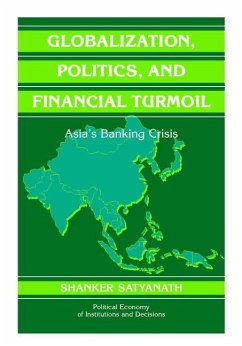Short description/annotation
Focuses on the role of miscommunication in the devastating financial crises of some developing nations.
Main description
In a world where capital moves freely across national borders, developing countries have increasingly been subjected to devastating financial crises caused by the sudden withdrawal of foreign capital. How do such crises come about(?)33; This book focuses on a novel causal path: that of miscommunication. By examining the determinants of Asia's financial crisis of 1997-98, it demonstrates why developing democracies are exceptionally vulnerable to breakdowns in communication between financial officials and the chief executive and outlines the disastrous consequences of such breakdowns. The book offers a framework for predicting where chief executives are most likely to be ill informed about critical economic variables. It also considers those situations in which politicians are dependent on financial officials whom they cannot completely trust or in which multiple veto players damage the flow of information.
Table of contents:
1. Introduction; 2. Bank regulation in the debate over capital flow liberalization; 3. The signaling argument; 4. Incredible signaling in democracies: the cases of Thailand, South Korea, and the Philippines; 5. Unorthodox solutions to the signaling problem: the cases of Malaysia and Indonesia; 6. Orthodox solutions to the signaling problem: the cases of Singapore and Hong Kong; 7. Some concluding remarks.
Hinweis: Dieser Artikel kann nur an eine deutsche Lieferadresse ausgeliefert werden.
Focuses on the role of miscommunication in the devastating financial crises of some developing nations.
Main description
In a world where capital moves freely across national borders, developing countries have increasingly been subjected to devastating financial crises caused by the sudden withdrawal of foreign capital. How do such crises come about(?)33; This book focuses on a novel causal path: that of miscommunication. By examining the determinants of Asia's financial crisis of 1997-98, it demonstrates why developing democracies are exceptionally vulnerable to breakdowns in communication between financial officials and the chief executive and outlines the disastrous consequences of such breakdowns. The book offers a framework for predicting where chief executives are most likely to be ill informed about critical economic variables. It also considers those situations in which politicians are dependent on financial officials whom they cannot completely trust or in which multiple veto players damage the flow of information.
Table of contents:
1. Introduction; 2. Bank regulation in the debate over capital flow liberalization; 3. The signaling argument; 4. Incredible signaling in democracies: the cases of Thailand, South Korea, and the Philippines; 5. Unorthodox solutions to the signaling problem: the cases of Malaysia and Indonesia; 6. Orthodox solutions to the signaling problem: the cases of Singapore and Hong Kong; 7. Some concluding remarks.
Hinweis: Dieser Artikel kann nur an eine deutsche Lieferadresse ausgeliefert werden.








